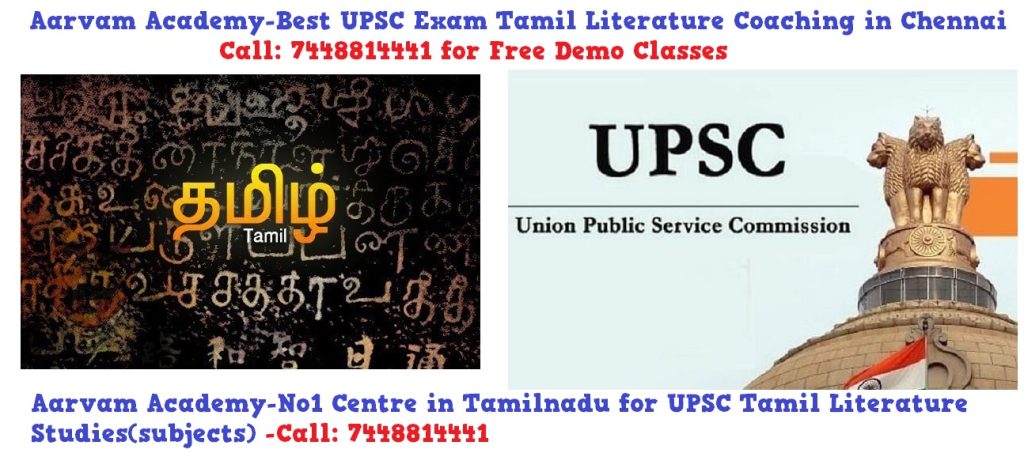Aarvam Academy- No1 UPSC Tamil Literature Coaching in Tamilnadu-Call: 7448814441 for Free Demo Classes.

When you look for UPSC Tamil Literature Coaching , Aarvam IAS Academy is the right choice for many reasons.First and Foremost reason is,Aarvam academy is the No 1 Institute in Tamilnadu for UPSC Tamil Literature Coaching studies.
The Aarvam Academy founder Mr.Shibi Kumaran himself wrote and published more than 10 books exclusively for Tamil Literature for UPSC optional subjects. He has years of experience in teaching Tamil literature to thousands of UPSC aspirants.
Here is another few reasons, why you should choose Aarvam Academy for your UPSC Tamil literature preparation
- Personalized Guidance and Support
Aarvam UPSC Coaching Centres have a team of highly experienced faculty members who specialize in various subjects. They provide personalized guidance and support to aspirants to help them achieve their goals. The faculty members offer regular feedback to the students on their academic progress and provide constructive criticism to enhance their skills. With the help of personalized guidance and support, aspirants can achieve their full potential and excel in the exams. - Comprehensive Study Material and Resources
Our Coaching institute offer comprehensive study material and resources to the students, which include books, notes, lectures, video tutorials, etc. The study material is designed to cover the entire syllabus, and aspirants can revise and practice with it. With the availability of such resources, students can save time and effort in searching for relevant reading material. In addition to this, We ensure that the study material remains updated and relevant to the changing trends and patterns in the examination. - Mock Tests and Assessments
Mock tests and assessments are an essential part of UPSC exam preparation. We conduct regular mock tests to help aspirants evaluate their strengths and weaknesses. These tests also simulate the final exam, which helps candidates to understand the exam pattern and structure. The mock tests help aspirants to analyze their performance, identify their weak areas and work on them. With regular practice and assessments, one can hone their skills and be confident during the actual examination. - Regular Workshops and Seminars
We organize regular workshops and seminars to help aspirants prepare for the exams. These events bring in experts in different fields to provide insights and tips on important topics. The workshops focus on improving the analytical, writing, and communication skills of the aspirants. The events also provide a platform for aspirants to exchange ideas and learn from each other. - Customized Study Plans
One size does not fit all when it comes to UPSC exam preparation. Aarvam Coaching academy offer customized study plans to suit the individual needs and requirements of the aspirants. The study plans are designed to optimize the aspirant’s strengths while addressing the weaknesses. With the help of customized study plans, aspirants can prepare effectively without wasting time on unnecessary topics.
Aarvam Academy Chennai ,now offers UPSC Tamil Literature Optional Demo classes for Free. Limited Seats are Available.Call: 7448814441 to Register your Seats.
What Includes with UPSC Tamil Literature Subject?
Paper-I:
-
History of Tamil Literature:
- Ancient Literature
- Medieval Literature
- Modern Literature
-
Dravidian Movement in Tamil Nadu:
- Contribution of Poets to the growth of Dravidian Movement
- Impact of the movement on the development of Tamil literature
-
Historical Evolution of Tamil Language:
- Antiquity of the language
- Linguistic changes in Tamil over the years
-
Grammatical Structure of Tamil:
- Phonology, Morphology, and Syntax
Paper-II:
-
Literary Forms:
- Poetry
- Prose
- Novel
- Drama
- Folk Literature
-
Classical Tamil Literature:
- Sangam literature
- Tolkappiyam
- Silappathikaram
- Manimekalai
- Purananuru, etc.
-
Medieval Tamil Literature:
- Bhakti movement
- Nayanars and Alwars
-
Modern Tamil Literature:
- Impact of Western Literature
- Socio-political Movements and Tamil literature
- Literary trends in the 19th and 20th centuries
-
Contemporary Tamil Literature:
- Prominent writers and their works
It’s crucial to stay updated with the latest UPSC syllabus and exam pattern, as changes may occur. Additionally, refer to previous years’ question papers, standard textbooks, and study materials to prepare thoroughly for the examination.
Books
